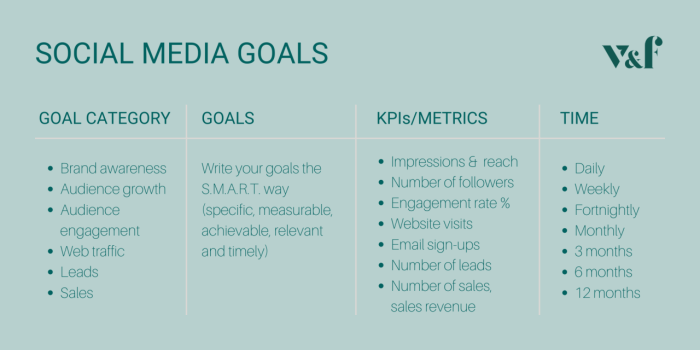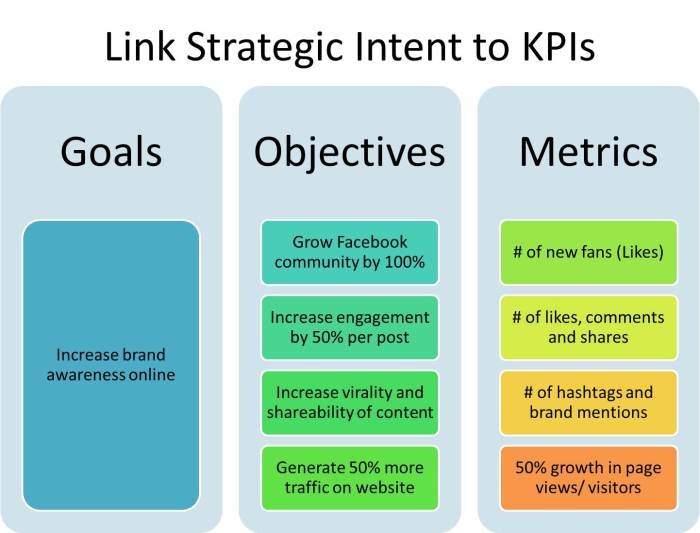Setting Social Media Goals is like crafting a roadmap for your online presence. It’s like planning your next big move in the digital world to ensure success and growth. Let’s dive into the art of setting social media goals and how it can elevate your business game!
In this guide, we’ll explore the importance of setting social media goals, the different types of goals you can aim for, how to make them SMART, and ultimately, how to measure and track your progress towards achieving them. Let’s get started!
Importance of Setting Social Media Goals

Setting social media goals is crucial for businesses to effectively utilize their online presence and drive meaningful results. By establishing clear objectives, companies can focus their efforts, track progress, and measure success in their social media strategies.
Impact on Social Media Strategies
- Increased Brand Awareness: Setting a goal to increase followers or engagement can help businesses expand their reach and visibility on social media platforms.
- Improved Engagement: Specific goals such as increasing comments or shares can lead to more meaningful interactions with the audience, fostering a sense of community and loyalty.
- Lead Generation: By setting goals to drive traffic to the website or capture leads through social media, businesses can enhance their sales funnel and ultimately boost conversions.
Aligning with Business Objectives
- Consistent Branding: Ensuring that social media goals are aligned with overall business objectives helps maintain a cohesive brand image and messaging across all channels.
- Measurable ROI: When social media goals are directly tied to business goals, it becomes easier to track the return on investment and assess the effectiveness of marketing efforts.
- Strategic Decision-Making: Having clear social media goals that align with business objectives enables companies to make informed decisions about resource allocation and campaign optimization.
Types of Social Media Goals: Setting Social Media Goals
In the world of social media marketing, setting specific goals is crucial for achieving success. Different types of social media goals serve different purposes and help businesses drive their strategies forward.
Brand Awareness
Brand awareness goals focus on increasing visibility and recognition of a company or product. Key metrics associated with this goal include reach, impressions, and social media mentions. Tracking engagement rates such as likes, shares, and comments can also help measure the effectiveness of brand awareness campaigns.
Lead Generation
Lead generation goals aim to capture potential customers’ interest and gather information for future follow-up. Metrics such as click-through rates, form submissions, and downloads can indicate the success of lead generation efforts. Conversion rates and cost per lead are also important indicators to track.
Customer Engagement
Customer engagement goals revolve around building relationships with the target audience and fostering interaction. Metrics like comments, replies, direct messages, and social media conversations can gauge the level of engagement. Monitoring sentiment and response times can provide insights into customer satisfaction and loyalty.
Short-term Goals vs. Long-term Goals, Setting Social Media Goals
Short-term goals are typically focused on immediate results, such as boosting website traffic or increasing followers. Long-term goals, on the other hand, are more strategic and aim for sustained growth and brand loyalty over time. While short-term goals can provide quick wins and feedback, long-term goals help businesses establish a strong presence and reputation in the long run.
Setting SMART Social Media Goals
In order to effectively set social media goals, it is important to make sure they are SMART – Specific, Measurable, Achievable, Relevant, and Time-bound. This approach ensures that your goals are clear, actionable, and focused on driving results.
Defining SMART Goals
- Specific: Clearly define what you want to accomplish with your social media efforts. For example, increasing brand awareness among a specific target audience.
- Measurable: Set metrics to track your progress and determine if you have achieved your goal. This could be the number of followers gained or engagement rate.
- Achievable: Ensure that your goals are realistic and within reach based on your resources and capabilities. Setting unattainable goals can lead to frustration and lack of motivation.
- Relevant: Make sure your goals align with your overall business objectives and are meaningful for your brand. They should contribute to your success in the long run.
- Time-bound: Set a deadline for when you want to achieve your goals. This creates a sense of urgency and helps you stay focused on making progress.
Measuring and Tracking Social Media Goals

In order to ensure the effectiveness of your social media strategy, it is crucial to measure and track your social media goals. This allows you to understand what is working well and what needs improvement, ultimately helping you optimize your efforts for better results.
Significance of Tracking and Measuring Social Media Goals
- Tracking and measuring social media goals provides valuable insights into the performance of your campaigns.
- It helps you identify which strategies are driving engagement and which ones are falling short.
- By monitoring metrics, you can make data-driven decisions to refine your approach and achieve better outcomes.
Tools and Techniques for Monitoring Social Media Metrics
- Utilize social media analytics tools such as Google Analytics, Hootsuite, or Sprout Social to track key performance indicators (KPIs) like reach, engagement, and conversion rates.
- Set up custom dashboards to easily monitor and analyze relevant metrics in real-time.
- Implement UTM parameters to track the effectiveness of your social media campaigns and determine the source of traffic and conversions.
Analyzing Data to Assess Progress Towards Social Media Goals
- Regularly review your social media metrics to evaluate progress towards your goals.
- Compare current performance against past data to identify trends and patterns.
- Use A/B testing to experiment with different strategies and measure their impact on your goals.





